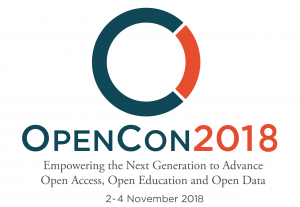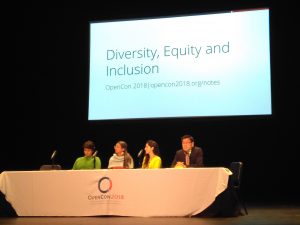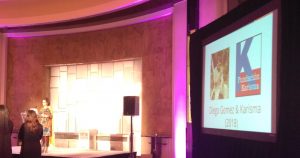 The Open Access movement is not standing still. Alongside the successes, there are also major questions and even concerns about inclusion, sustainability and whether it is achieving its original goals. OpenCon may not provide the answers, but provides an excellent opportunity to share ideas and hear new ones, and explore potential ways forwards.
The Open Access movement is not standing still. Alongside the successes, there are also major questions and even concerns about inclusion, sustainability and whether it is achieving its original goals. OpenCon may not provide the answers, but provides an excellent opportunity to share ideas and hear new ones, and explore potential ways forwards.
The conference is held annually, organised by SPARC, and looks at open access, open science and open education. It is the only conference of its kind, gathering a small number of selected early career researchers, NGOs and government officials, as well as other actors involved from all over the world. This year’s OpenCon took place in Toronto from 2 to 4 November, and once again, it was an unforgettable experience.
Everything is set up in a way that makes every participant chat at least once with every one of the other participants. Panels take place in between story circles, do-a-thons, unconferences and regional workshops in which the audience takes over. This is what makes it so unique: a conference made, to a large extent, by its participants.
Given that it is difficult to summarise what happened at OpenCon altogether, here is a recap of some projects and topics that were discussed during the conference:
The panel on diversity, equity and inclusion in open research and education
 This is one of the most-favoured panels in OpenCon, which goes back to its very essence. It is based on the fact that “while the Open Access, Open Data, and Open Education movements often lean on rhetoric around social justice, equity, and the democratization of knowledge, in many ways, the movements continue to marginalize underrepresented scholars and students. Mainstream efforts to advance Open centre digital solutions and dominant (often Western) ways of knowing”.
This is one of the most-favoured panels in OpenCon, which goes back to its very essence. It is based on the fact that “while the Open Access, Open Data, and Open Education movements often lean on rhetoric around social justice, equity, and the democratization of knowledge, in many ways, the movements continue to marginalize underrepresented scholars and students. Mainstream efforts to advance Open centre digital solutions and dominant (often Western) ways of knowing”.
Panellists Jasmeen Patheja (Founder/ Director of Blank Noise), Leslie Chan (Associate Professor, University of Toronto Scarborough), Denisse Alboronoz (The Knowledge GAP, University of Toronto Scarboorugh) and Alexis C. (Pineapple Laboratories) introduced different perspectives and projects, that are all impacted by a lack of diversity, equity and inclusion or that could benefit from it. All panellists underlined the opportunity that the open access movement has to make change happen through knowledge sharing.
Denisse for instance talked about what it could mean to re-imagine open science from a feminist perspective, which she has been exploring at OCSD.net. Leslie looked into the global north and how institutions there could ensure that the open access movement fosters inclusion, diversity and equity.
Presentations are available online (see this video, starting on minute 48).
IFLA’s research on International Governmental Organisations
IFLA used this opportunity to share its recent research on the topic of open access in intergovernmental organisations. As already presented at the Creative Commons summit, while much of the discussion around open access focuses on scientific research, free and meaningful access to reports and data produced by public bodies is an important part of the picture. In the case of intergovernmental organisations (IGOs) in particular, there are four main benefits from open access to the works they produce: greater transparency around decision-making; support for research, jobs and growth; the moral justice of the public being able to access works for which they have paid; and the example set to national governments.
Some IGOs, such as UNESCO or the World Intellectual Property Organisation (WIPO), have been leading the way with open policies. However, there are still many IGOs whose policies are far from being open.
IFLA will soon release a statement on the topic and make the background research available on a user-friendly platform.
The OpenAccess button and copyright librarians
OpenCon was attended by many “copyright librarians”, or librarians whose position within the university involves dealing and giving advice on copyright to library users, faculty staff and researchers. They all insisted on the importance that copyright plays in the library, the amount of request for advice they receive, and the lack of trained staff on the matter.
One of the key things in their role is to guide researchers throughout the publication process, and encouraging the deposit of a pre- or post-print on the library’s repository for it to be available to other researchers. Natalia Norori and Joe McArthur have been working on a project in the framework of the open access button that seeks to make this easier for researchers. The discussion started through a do-a-thon that tried to answer the question “self-archiving and copyright: How might we help researchers be more conscious of what versions of their work they can/can’t share online?”. More information is available on the github page.
OpenCon satellite events
Every year, SPARC also offers support to people who wish to organise meetings on open access, open science and open education in their regions. Previous editions of OpenCon have gathered people willing to do so from Latin America, a group that has successfully organised two OpenCon “Latam” satellites both in Mexico (2017) and in Argentina (2018).
Another successful OpenCon satellite was celebrated in the United Nations Headquarters in New York on October 2018. The UN Headquarters library brought the discussion on open access, open science, open data and open educational resources to the UN. The event was co-hosted by SPARC, and was attended mainly by librarians and higher UN officials. Panellists highlighted on the contribution that open access can bring to the achievement to the Sustainable Development Goals. Part 1, part 2 and part 3 of the session can be watched on the UN Web TV webpage.
Next Generation Leadership Award
 The next generation leadership award is given each year to a person who helped advance significantly open access, open science or open education in its country, region or internationally. This year’s award went to Diego Gómez, a biologist who faced criminal charges for sharing an article. Fundación Karisma, who offered him support throughout the trial and spread the word internationally, collected the award. More information is available in Karisma Foundation’s webpage.
The next generation leadership award is given each year to a person who helped advance significantly open access, open science or open education in its country, region or internationally. This year’s award went to Diego Gómez, a biologist who faced criminal charges for sharing an article. Fundación Karisma, who offered him support throughout the trial and spread the word internationally, collected the award. More information is available in Karisma Foundation’s webpage.
Several other projects: the Darakht-e Danesh Online Library for Educators
OpenCon is also a gold mine of information on local initiatives with great impact. One good example is the Darakht-e Danesh Online Library for Educators, a project initiated by Jamshid Hashimi that aims at using OER to foster education in Afghanistan. It “is a repository of open educational resources for teachers, teacher trainers, school administrators, literacy workers and others involved in furthering education in Afghanistan. These open source resources include lesson plans, pedagogical tools, exercises, experiments, reading texts, work books, curricula and other resources for use in Afghan classrooms”.
Conclusion
OpenCon means going back home with more questions than answers, which is also a sign of a healthy movement that questions its own foundations. Participants want to ensure that the open movement does not end up creating the same burdens that triggered it, that it benefits every region in the world equally, and that it is sustainable in the long-term.
And if you weren’t there, you haven’t necessarily missed it – the main sessions are available on their YouTube page (see for day 1, day 2 and day 3).
There is certainly a lot to learn about this subject. I like all
of the points you have made.